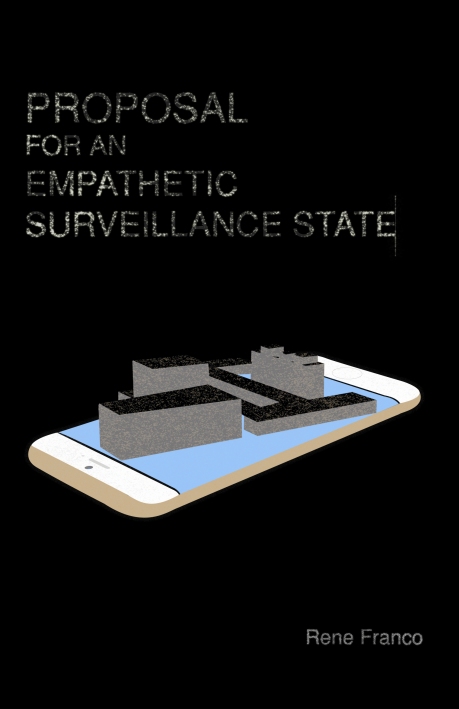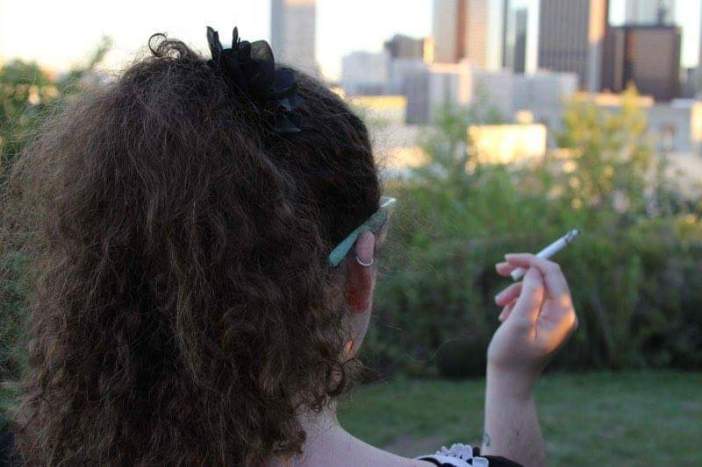Rene Franco is a an artist, filmmaker, and writer. I have had the pleasure of knowing Rene since we were fourteen years old. Even then, Rene was an activist. Inviting me to read, think, and protest any injustices.
Now, ten years later, I am so honored/pleased/ecstatic/am I dreaming/happy to announce that his book, Proposal for an Empathetic Surveillance State was published by Paper Plane Pilot Publishing the first week of November. Cover design by Laura Khayat.
Rene, though he won’t admit it/doesn’t understand why I always say this, was one of the first people to force-feed me literature.
During our Chemistry Honors class (which I failed and had to make up that summer. Okay, I got a D+…long story) we talked the whole period (and somehow didn’t ever get in trouble?) about the books he left for me in my locker. (How do you not remember this?!) Then he moved away to San Francisco to study film/art. He ran an art gallery from his garage in San Francisco. Then he came back home to Los Angeles and worked for just about every major art museum in the city.
We worked on many stupid class projects together. Other than that, our talents had never melded together perfectly to create. When Rene approached me with his ambitious idea, we laughed about all it was trying to accomplish. I smiled and said, “Okay, Rene. Let’s do it.”
I wholeheartedly took on this project, excited to finally combine our talents into something relevant and tangible.
Now, I am pleased to share this timely interview between editors, Michael J. Hetzler and myself and author/artist Rene Esteban Franco:

1.) What part of Proposal for an Empathetic Surveillance State was the most difficult to write?
The world of hackers and whistleblowers is incredibly complex, a Borges labyrinth of insider terminology that is deliberately meant to be unfriendly so as to keep undesired attention away from it. Immersing myself into this world required more painstaking research than I ever imagined. Much of it simply was for my own understanding of this subculture as I realized that it wasn’t crucial for casual readers to understand every aching complexity of the hacker world. Deciding what was essential and how to present it was by far the trickiest thing to accomplish.
2.) What was your goal with this book? What effect did you hope for it to have?
Over the course of working on this project I talked with many people who essentially said “Yeah, that’s an interesting issue, but I don’t see surveillance as a super important topic.” Or they would say “Yeah, it’s scary but I don’t really have anything to hide.”
These general assumptions regarding mass surveillance were what led me to seek another inroad to confronting this.
Ever since the Snowden leaks of 2013, the questions and qualms brought forth have loomed over me. I was obsessed with researching it because I believe, as Snowden and many other journalists and activists do, what the NSA is willingly doing is an existential threat to the little democracy we have left. And yet, there seems to be a fundamental lack of interest in engaging with this issue. It seems too large, too present, too much someone else’s issue. By taking away some of the off-putting technical language and personalizing the issues in a narrative fashion I was hoping to present an alternative means of creating a dialogue around the ramifications of everyone’s complicitness with the surveillance state.
3.) How does your artistic and cultural background inform your writing?
I approach every project according to the medium that best suits it. This is a means of remaining open to whatever the process will dictate is the best “end” goal for the project. In this case, I didn’t start out with the intention of writing a book. It was solely supposed to be a short film. However, over the course of researching this and adding in supplemental backstory to the hacker I realized it could not all be contained in a condensed 15-minute film.
4.) You work with various forms of media. What can you do with writing that you can’t do with film/visual art?
Writing allows for a directness that I am not comfortable with in other mediums. I can directly address an audience (such as using the second person) and craft a narrative that is much more didactic and implicates the viewer as well as myself in the process.
5.) What were the advantages and disadvantages of your multi-media approach to this book?
The loss of control of the narrative was something I realized midway through the process. Because, surely, there will be people who only read the book and not see the video and vice versa. And to my mind they may only take away half the intended meaning from one of those forms but that, I’ve realized, is okay too. It’s far outside my control to see what anyone will take away from either experience and trying to assume otherwise is silly.
6.) Did you expect your predictions of the election to come true?
Absolutely not! I was just as shocked as every other liberal in America by the whitelash unleashed by this election. I was listening closely to every poll and every projected estimate all day throughout Election Day and this was not at all what I assumed would happen.
When I started this project, the election was not a factor at all. I was focused on the issues of privacy and surveillance but through the narrow lense of this hacker who is obsessed with Julian Assange. As the election became a spectacle I couldn’t ignore anymore, I realized it was a crucial part of this narrative. Still, even in speculating what a future Trump presidency would look like I only intended that to come across as a metaphor for the consequences of continuing to ignore the mass surveillance apparatus that currently exist. But it’s no long speculative. A racist, sexist, petty demagogue is about to control the most sophisticated surveillance arsenal ever constructed. And that should scare everyone.
7.) Who were your influences for the writing of this book? (artistic and otherwise)
I am eternally in debt to the work of artists who did much of this research ahead of me with access that I could never have. They include Hito Steyerl, Trevor Paglen, Simon Denny, and Laura Poitras.
For the writing portion I’d say Junot Díaz and Leslie Jamison’s book The Empathy Exams.
As for the video there were tons of video artists and filmmakers who shaped my approach from Jordan Wolfson, Cecile B Evans, Doug Aitken, Chris Marker’s La Jetee, and Francis Coppola’s The Conversation.
8.) What aspect of the book are you proudest of?
Probably the part I had no role in: the publishing! I would have never been able to do this without an incredible set of editors who were crazy enough to try to meet my seemingly unrealistic deadline.
9.) Who do you hope reads this book? Why?
Is it too much to hope everyone does? Namely because we are all implicated in the systems (surveillance, patriarchy) that the hacker travels throughout the course of the book. And I understand that it may not be comfortable reading for most especially in the manner that it parallels reality up until a very key point. But we need dystopias. Relevant ones not ones that cast our villains in an unrealistic manner. The real horror at the moment isn’t going to come from Skynet or HAL. It’s going to come from ourselves and our lack of indecision to do something to stop plausible dystopias before it’s too late.
10.) What’s next for you?
I’ve always aimed to try to make relevant political work. The election of Trump only confirmed my need to continue to make more, only at a much quicker pace. Which is why for the next year at least, I’m attempting to make one completed artwork a month that protests a specific component of Trumpism. I want to make this administration my muse as perverse as that may seem. I refuse to see alternatives because to look away from it would be immoral in my thinking.
For a review PDF of Proposal for an Empathetic Surveillance State email thepaperplanepilots@gmail.com. To follow Rene’s art, writing, and film, watch out for Wandering Savage‘s posts on Paper Plane Pilots.


